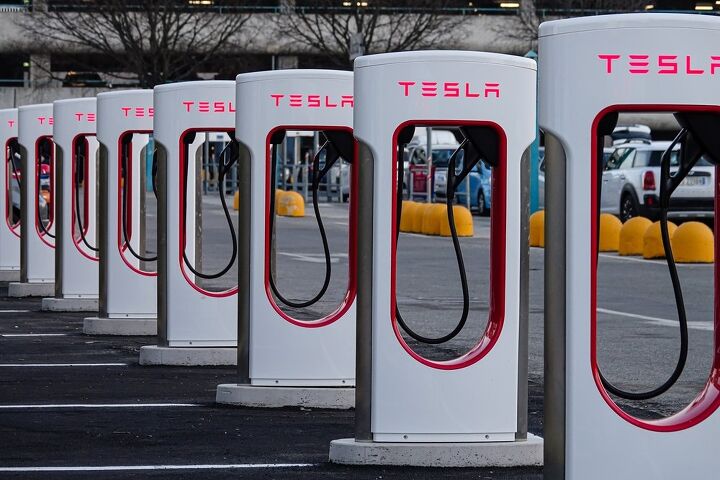Tesla Sets the Charge: Universal EV Standards in the Making
The electric vehicle (EV) charging sector is experiencing a major shift with the introduction of Tesla's North American Charging Standard (NACS). This initiative is transforming the EV charging experience, aiming to parallel the simplicity of fueling conventional gas and diesel vehicles.
Tesla's Influence on Charging Standards
Tesla's NACS, known for its efficiency, is gaining traction among various automakers, suggesting a move towards an industry-wide standard. This development aligns with standardization efforts by SAE International. Ford was the first to adopt NACS in May 2023, with numerous other manufacturers following.
Broad Adoption of Tesla's NACS by Automakers
- Audi, BMW, and Subsidiaries: Starting in 2025, Audi, BMW, and their subsidiaries, including Mini and Rolls-Royce, will adopt NACS in North America. They also plan to offer adapters for existing CCS-port vehicles.
- Fisker, Ford, and Genesis: Fisker's future vehicles, Ford's 2024 EV models, and Genesis's North American fleet from late 2024 will incorporate NACS, alongside adapters for CCS models.
- GM, Honda, Hyundai, and Jaguar: These brands are set to switch to NACS from 2024 or 2025, with adapters for existing CCS-equipped vehicles.
- Kia, Lexus, Lucid, and Mazda: Adoption by Kia starts in late 2024, while Lexus, Lucid, and Mazda will join in 2025. Kia and Lucid will provide adapters for older models.
- Mercedes-Benz, Mini, Nissan, and Polestar/Volvo: These manufacturers plan to introduce NACS in 2025, along with adapters for current models.
- Porsche, Rivian, Rolls-Royce, Scout Motors, and Toyota: These companies are set to adopt NACS in 2025, with plans for various adapters.
- Volkswagen Group: VW's 2025 models will feature NACS, with development of adapters also underway.
Expansion Beyond Tesla: Other Charging Networks
Major public charging networks, ChargePoint and Electrify America, are preparing to integrate NACS connectors, thus broadening the charging options for EV owners.
Consumer Reports' Insights on EV Charging
Tesla's Superchargers, noted for their reliability and user-friendliness, are soon to be accessible to other brands, with several automakers planning to use Tesla's Superchargers from 2024 or 2025.
The Future of EV Charging
Tesla's push for a universal charging standard marks a significant advancement in making EV charging more user-friendly and accessible. This change is poised to enhance the attractiveness of EVs and could influence consumer purchase decisions.
This article was co-written using AI and was then heavily edited and optimized by our editorial team
More by TTAC Staff
Latest Car Reviews
Read moreLatest Product Reviews
Read moreRecent Comments
- Bill Wade I was driving a new Subaru a few weeks ago on I-10 near Tucson and it suddenly decided to slam on the brakes from a tumbleweed blowing across the highway. I just about had a heart attack while it nearly threw my mom through the windshield and dumped our grocery bags all over the place. It seems like a bad idea to me, the tech isn't ready.
- FreedMike I don't get the business case for these plug-in hybrid Jeep off roaders. They're a LOT more expensive (almost fourteen grand for the four-door Wrangler) and still get lousy MPG. They're certainly quick, but the last thing the Wrangler - one of the most obtuse-handling vehicles you can buy - needs is MOOOAAAARRRR POWER. In my neck of the woods, where off-road vehicles are big, the only 4Xe models I see of the wrangler wear fleet (rental) plates. What's the point? Wrangler sales have taken a massive plunge the last few years - why doesn't Jeep focus on affordability and value versus tech that only a very small part of its' buyer base would appreciate?
- Bill Wade I think about my dealer who was clueless about uConnect updates and still can't fix station presets disappearing and the manufacturers want me to trust them and their dealers to address any self driving concerns when they can't fix a simple radio?Right.
- FreedMike I don't think they work very well, so yeah...I'm afraid of them. And as many have pointed out, human drivers tend to be so bad that they are also worthy of being feared; that's true, but if that's the case, why add one more layer of bad drivers into the mix?
- ChristianWimmer I have two problems with autonomous cars.One, I LOVE and ENJOY DRIVING. It’s a fun and pleasurable experience for me. I want to drive my cars, not be driven by them.Two, if autonomous cars have been engineered to a standard where they work 100% flawlessly and don’t cause accidents, then freedom-hating governments like the POS European Union or totally idiotic current German government can literally make laws which ban private car ownership in their quest to save the world from climate change bla bla bla…


































Comments
Join the conversation